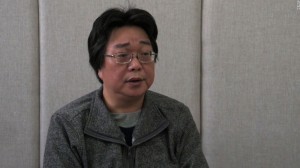The daughter of Hong Kong bookseller Gui Minhai, who has been held in an undisclosed location on the Chinese mainland since October 2015 on suspicion of trafficking in banned books, pleaded once again this week for the governments of Sweden and the United Kingdom to apply diplomatic pressure for his release.
Gui was originally abducted from his vacation home in Thailand and taken into detention on the Chinese mainland along with four of his colleagues from publisher Mighty Current, which specializes in political exposés on the Chinese Communist Party. The other men were all released over the following year, but Swedish citizen Gui is still detained. His adult daughter Angela Gui has worked tirelessly to keep her father’s case in the international spotlight, most recently with a column in The Guardian reminding Britain of the promise it made when its former colony of Hong Kong was returned to Chinese control in 1997.
That treaty, the Sino-British Joint Declaration, laid out the separations between Hong Kong and the mainland Chinese government which are commonly referred to as “one country, two systems.” A key point of the agreement was that Hong Kongers would continue to enjoy freedom of speech and press, Angela Gui said:
Twenty-one years ago, [Prime Minister] John Major pledged that Britain would continue to defend the freedoms granted to Hong Kong by the Joint Declaration against its autocratic neighbour. Today, instead of holding China to its agreement, Britain glances down at its shoes and mumbles about the importance of trade. It is as if the British government wants to forget all about the promise it made to the people of Hong Kong. But China’s crackdown on dissent has made it difficult for Hong Kongers to forget.
At the same time, newly elected Hong Kong Chief Executive Carrie Lam also signaled that she would not intervene in Gui Minhai’s case, claiming that “it would not be appropriate for us to go into the mainland or challenge what happens on the mainland”–ironically because of the “one country, two systems” structure that the mainland government blithely ignored in taking him into custody.
Gui Minhai is a citizen of Sweden, where he received asylum in 1989. In light of Swedish Prime Minister Stefan Löfven’s recent announcement that he will visit China next week, independent publisher Melville House called on him to raise the issue of Gui’s detention with Chinese authorities. Ideally this would be a given, said Melville House’s Ian Dreiblatt in a blog post, but many countries that pay lip service to human rights have nevertheless been hesitant to broach the topic directly with China for fear of jeopardizing lucrative trade deals. Dreiblatt encouraged readers to contact the Prime Minister’s office and ask him push for Gui’s release.
Help support CBLDF’s important First Amendment work in 2017 by visiting the Rewards Zone, making a donation, or becoming a member of CBLDF!
Contributing Editor Maren Williams is a reference librarian who enjoys free speech and rescue dogs.
